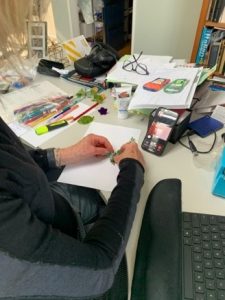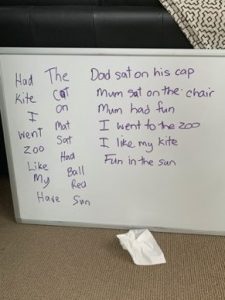Positioning your CV to emphasise your worth rather than your age
From time to time we hear the word ‘ageism’. This can come from within organisations or through the media. Fortunately, I haven’t heard it a lot recently and I am hoping that it is something that is diminishing. Mature workers have so much experience to offer employers!
Connected to this, is applying for a new role in later life and in this context, many mature workers find that they are not reaching the short list for interviews. This doesn’t have to be so!
Emphasise strengths
Strategically, there are a number of things that we can do when we review our CV, to position ourselves well, emphasising our experience, achievements, and skills rather than our age.
Firstly, a key aspect is to position ourselves well on the front page of our CV and not disclose our age. This includes several things:
- Write an opening paragraph that for example, highlights the relevant experience you have to offer, those areas you particularly enjoy in a role, and what drives you. In other words rather than say what you want, talk about your experience. This provides the reader with a good overview.
- The next very important aspect to have on your CV, and in fact one that many people leave out, is a list of your skills and alongside each one, a brief (one-two lines each) about your specific approach with each skill. The importance of this can’t be over emphasised as employers are looking to see if you have a match of skills with those they are looking for.
- If you have qualifications, list them on the front page, but don’t add when you completed them because that gives your age away.
- An optional extra on the front page, could be a section, no more than four to five bullet points, entitled Career highlights. These highlights should draw attention to aspects you have experience/success in that are directly related to the role you are applying for.
All of the above, will make you stand out and position you well, thus encouraging the reader of your CV to want to turn the page and find out more about you.
Downplay age
Secondly, for the remainder of your CV:
- List your current and previous employment history to show the last 15-20 years and include the dates.
- For the remainder of your employment history, head this area up with the heading Prior to (for example) 2002 and list relevant roles, without dates beside them.
With this approach you will see that nowhere when the reader goes through your CV, will they be able to calculate your age. This can enable mature workers to have a greater opportunity to get onto the short list. And with this opportunity, then be able to get in front of an interview panel to demonstrate their capability and enthusiasm for the role. Obviously, the next step is up to you to convince the panel that you are the right person for the role, but at least with this approach you have this opportunity.
For further information contact Cynthia by email here
Career outplacement guide
If you are affected by recent redundancies, this can be a very difficult time. To assist you in this we have designed the following questions, you may want to ask yourself or seek advice to assist you in moving forward:
Career assessment
Are you able to identify your key strengths, drivers and interest areas?
Are you able to articulate your achievements relevant to the position you are looking for?
Are you able to describe where and why you want to work in a particular role?
Are you able to describe what industry/sector you would like to work in?
Are you able to identify organisations that you would like to work in and why?
Curriculum Vitae
Does your CV contain your strengths separately listed?
Does your CV contain a good positioning statement?
Does the front page of your CV invite/motivate the reader to turn the page?
Have you listed achievements for each of your major roles?
Would a strength-based CV promote you better than a chronological or vice versa?
Does your CV show an overall theme that is consistent with the role you want?
Approaching the Market
Can you clearly articulate your job /role interests to a recruitment consultant?
Do you know how to best work with a recruitment consultant?
Are you confident in writing the covering letter?
Have you got a marketing plan for your job search?
Are you using all of the potential market opportunity sources?
Networking
Do you know how to effectively operate in the “hidden market”?
Do you have a list of network contacts that can work for you?
Are you aware of the questions to ask in a network conversation?
Do you know how to expand your network contact?
Interview
Can you positively and effectively promote yourself?
Are you effectively able to answer the question “tell me about yourself”?
Do you know how to answer behavioural questions succinctly?
Are you able to articulate what makes you unique/the value you can add?
Do you know how to best maximise your opportunity to provide key information?
Financial
Can you accurately identify what your income & expenses, & assets & liabilities are?
Are your finances set up to meet short and long term threats to your financial security?
Do you have clear financial and lifestyle goals, and are you able to achieve these?
Do you want to discuss financial implications with an independent financial guidance consultant?
Retirement
Have you thought about how you will spend your time in retirement?
Have you talked with your partner or family about your wants and needs?
Do you know your partner’s expectations?
Do you have clear financial goals that match your expectations?
If you need help in any of these areas
Contact Cynthia Munro, Cynthia@c2consulting.co.nz or 0274 865 065
Retirement Planning tips
By Cynthia Munro and Craig Wylie
Increasing life expectancy means that we will potentially be spending the equivalent of half (or more) of our working lives in retirement. This is a significant portion of our lives, therefore we should be planning how we will meaningfully spend the time, as well as planning our finances to meet our desired lifestyle in retirement.
Lifestyle Planning
Here are questions for you to consider when preparing for your new lifestyle:
- What are my concerns; what will I miss when I leave the workforce?
- What provides meaning and purpose for me and what does this translate to in the future?
- What will change with my spouse/partner, family and friends?
- What interests provide meaning and fulfillment?
- Will I want to continue working in a different capacity – what might this look like?
- What type of activity might provide satisfaction and meaningfulness?
- What new learning might I like to pursue – e.g. a hobby, intellectual pursuit or an interest?
- How do I ensure optimum physical and emotional health and well-being?
- What do I need to think about in relation to my location; how will this impact me and significant others?
- How will my social life differ and what do I need to do to remain connected?
- How will I seamlessly transition? What is my action plan?
Financial Planning
Having financial strategies and structure to facilitate the achievement of financial and lifestyle goals in retirement is vital to a happy and successful retirement. Here are some questions to consider:
- Do I understand my present financial position and timelines?
- Assets/liabilities; income/expenses; time frames pre & post retirement?
- What could impact on my financial security before and during retirement?
- My financial and lifestyle goals and objectives
- What lifestyle would I like/what lifestyle can I afford – what will it cost?
- What financial/lifestyle goals do I need to meet before retirement – cost?
- How do I get from here to there?
- Cash Management and savings:
- Am I making the most of my current income?
- What do I need to do differently?
- Investments:
- What keeps me awake at night when thinking about my finances?
- Do I understand risks and returns of different investment/KiwiSaver options?
- Financial Plan:
-
- Do I need to engage an Authorised Financial Adviser? Do I require a referral to a trusted AFA?
- Can I prepare my own plan using resources available (e.g.Sorted website) and/or with guidance?
Further information can be found here
Interview tips
By Cynthia Munro
The job interview is a mutual exchange of information between you and the prospective employer. Unfortunately, a number of us find interviews a little daunting for a range of reasons. One thing you can control in this situation is to prepare well. This helps with your confidence on the day.
Some tips:
- Always ask for a position description so you can comprehensively identify how you fulfil the competencies listed and the desired factors
- To demonstrate that you are the best candidate for the role, prepare, prepare, prepare!!
- Provide more in-depth information about yourself that is not in your curriculum vitae
- When asked, “why did you apply for this role,” in addition to talking about your interest, your ability and experience, add to this and say why you would like to work for the organisation
- Identify substantive answers that can demonstrate and testify to the skills you have
- When answering behavioural questions, be concise – I suggest thinking, then answering in bullet points using STAR or CAR so ensure your answer is concise
- With the question, “tell me about yourself,” instead of reiterating your work history, or rambling because you don’t how to answer, say something like, “I will tell you 3 things”. g. “what drives me”, “what I like about my current role” (being positive), “my interests are……”
- Think about key questions to ask the interviewers that demonstrate your interest and suitability for the role e.g. “What does success look like after 6 months in the role”? “How would you describe the organisation’s culture”?
- If you are asked about salary expectations, ensure you have thought about this and offered a range as your answer rather than a definitive figure
- Always obtain feedback later to evaluate what went well and what could have gone better
Some questions to ask yourself
- Are you able to articulate your value proposition – the value you can add?
- Has your past preparation been enough? If not, what do you need to do more of this time?
- Are you able to convey your interest in the role strongly enough?
- Have you completed enough research on the organisation?
- Is there someone there that you could talk to about the organisation?
Further information can be found here
CV tips
By Cynthia Munro
Having your CV ready for potential opportunities is useful at anytime and given these uncertain times during Covid-19, being prepared, is a good thing to do. When it is an employers’ market – as opposed to an employee’s market – employers can be swamped with applications, so you need to ensure that your CV stands out.
Here are 4 tips and questions to get your CV prepared.
- Ensure the contents of your front page encourages the reader to turn the page.
- Contact details need only to contain your phone numbers, email address, and possibly your LinkedIn address
- If you write a personal profile/positioning, make it punchy. Instead of, “I am a friendly and outgoing person ……”, try something like “5 years experience in ………. Particularly skilled/enjoy ……………”
- Have a section outlining your skills. This enables the reader to quickly identify quickly what you have to offer. Order these skills according to the role you are applying for
- If you have qualifications, add the important ones to the front page
- Where you list your employment history, put the dates on the right-hand side – this then allows the reader to clearly focus on your role title and the organisation you worked for.
- If you decide to have an interest section, elaborate on these e.g. Music – currently learning the guitar; Walking – enjoy the outdoors and a chance to exercise
- We no longer need to add the names of referees, just add “Referees available on request”
Some questions to ask yourself
- Have I listed achievements for each of my major roles?
- Would a functional (strength-based) CV promote me better than a chronological (employment history based) CV or vice versa?
- Does my CV show an overall theme that is consistent with the role I want?
Further information can be found here
Virtual Grandparenting during Covid-19
For those young parents with young children working from home, trying also to entertain them whilst working can be a very hard juggle. In my own family, my daughter – Mel, who lives in Adelaide, has a role that involves various meetings and deadlines during any one day. Her husband is an essential worker, so she is often the parent to Felix, a 5-year-old, whilst working full-time.
By Cynthia Munro
In this time of Covid-19 there are many families in this situation, and it can be particularly hard when there is only one parent. I decided that perhaps there was a way that I could help out, 3227 kms away. It was a success, so I would like to share this, as there may be many grandparents and grandchildren who would benefit from the opportunity, not to mention the break that the parents would have to allow them to get on with their work.
Mel and I discussed a structure for Felix for the day, which involved in general some school zoom activities, some educational programmes on the iPad, some exercise in the form of walking, some further learning apps and then free time. Where I came in initially on this timetable was “Granny C time” for 30 minutes. This took a little bit of practical and creative thought and preparation. For the first session, I came up with 4-5 different activities and prior to the session communicated to Mel the resources that Felix would need for each session, like pen, paper, Sellotape, glue, card, ice block sticks, pipe cleaners. Fortunately, he had these. Each morning I would let Mel know which resources to lay out for him on the table.
He then Face Timed me at the exact time, and the session would begin. The session would always involve colouring in (the page for this I sent through each morning) and I would colour the same drawing and then we would look at each other’s drawing; this was followed by me reading him a book and he would look at the pictures (I flipped the screen for this), we would then do another activity using the pipe cleaners (or similar) and again we would show each other what we had made. Doing each of the activities at the same time seemed to be really important. Lastly, each day I would make up sentences on the whiteboard (could use a screen or sheet of paper) and he would read them to me, thus enhancing his reading ability.
This went from 30-minute session to 60-minute sessions and the time went by so fast for both of us. Feedback from Mel was that he was thoroughly engaged for the whole time.
For me this experience was many fold – it was a break from my own work, it was the opportunity to connect with Felix, it was a chance to experience something different and it gave Mel back some precious time she needed for her work.
Virtual grandparenting, I discovered is possible, enjoyable and rewarding for all. Try it, or get your parents to give it a go.



We are a panel provider for the AoG (All of Government) consultancy services
We are pleased to advise that we are a Panel Provider on the AoG Consultancy Services contract for both Business Change and Human Resource categories.
We offer, on a New Zealand wide basis, the range of services set out below via coaching, workshops or consultancy services under the contract and are supported by associate consultants around the country.
Business Change | Human Resources |
|
|
Life after professional rugby
The Hurricanes franchise is a valued client of ours. The guys themselves are great to work with.
At the start of another session working with the team, Cynthia delivered a course entitled “Life after rugby” this workshop started the process of working through options for the guys once their professional playing days cease or if, unfortunately, they are injured and aren’t able to return to professional playing.
Here is a photo of Cynthia with some of the Hurricanes squad courtesy of NZ Rugby World (Issue 179 April/May 2016). This group were the new members of the Hurricanes family.
A selection of comments from workshop attendees
- “The content was presented at the right level”
- “Thanks Cynthia! It was great & I really appreciated your openness and acceptance of everything in the group”
- “Very good – thank you”
- “Very useful course – a lot to process. Really pleased”
- “The facilitator was knowledgeable in the subject matter”
- “Valuable information”
We are supporting Money Week 2014
Money Week is an awareness campaign promoted by the Commission for Financial Literacy and Retirement Income and this year takes place during the week 13 – 19 October.
As an experienced member of the Institute of Financial Advisers, Craig Wylie is supporting the IFA and CFLRI by offering Pro Bono financial advice to members of the public. More information here
The 2013 Money Week was a huge success nationally. Craig participated in that by hosting a live chat on Stuff.co.nz as well as providing Pro Bono advice to members of the public who sought advice via the Institute of Financial Advisers.
